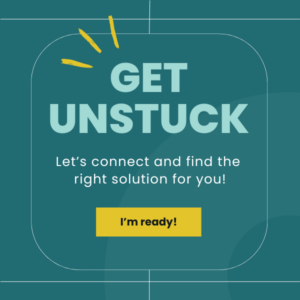Pardot Admins are some of the most humble people I’ve worked with.
“Well, we’re just doing the basics.”
“We’ve probably set it up all wrong.”
“We don’t know what we’re doing.”
On rare occasions, you open a Pardot org and you’re like “what tornado came through here?”
But much more often, you log in, look around, and there are some pretty cool things happening under the hood. So what stops Pardot admins from feeling confident about their skills and abilities?
The Impostor Syndrome, defined
Do you ever find yourself gripped with anxiety that someone will suddenly realize that you have no idea what you’re talking about? Or as Mike Myers put it, do you live in constant fear that at any time the “no-talent police” will come and arrest you?”
That’s the impostor talking. It likes to rear its little head at times when we perceive risk — but making yourself feel and look small in these situations serves no one.
If you’ve done the hard work to build your skills as an admin and as a digital marketer, effing OWN THAT.
Don’t say it was easy (you know it wasn’t). Don’t shudder at the atta boys (slash girls). OWN IT!
Why this looms large with Pardot and Salesforce
The Impostor Syndrome spans all roles, all functions, all industries. But I’d posit that it’s even worse in our slice of the universe.
If you only have visibility to your Pardot org, it’s hard to compare or benchmark yourself. You feel like you’re missing the mark, because it’s unclear where the mark is. People in your organization might not quite understand what you do — heck, even people on your own team might not even get it.
This all feeds the insatiable Impostor.
To be clear, I’m not an advocate for BSing and pretending that you know something that you don’t. There are plenty of people in the ecosystem that are on THAT end of the spectrum too.
But if you’ve done the hard work, you’ve invested blood/sweat/tears into this thing — give yourself some credit. And maybe other people will too.
How we beat the sneaky bastard
I’d like to hope that the Impostor just goes away on day. But if Tina Fey, Maya Angelou, and Albert Einstein all feel it, I guess I’m not holding my breath on that one.
So what can we do in the meantime? Some ideas, for starters:
1. Stop putting yourself down
When someone compliments you, or asks how you managed to do XYZ…smile. And say “thanks, I put a lot of work into that.”
Not “it was easy.” Not “it was nothing.”
Swallow those words, and take the damn compliment.
2. Join a user group
I have so much love for the Salesforce and Pardot user community. User group meetings are a fantastic place to do “show and tell” with your org, swap war stories, and connect with people who genuinely understand the challenges you face. I never cease to be amazed by how helpful and giving fellow admin are in these setting.
In a world where marketing automation and tech roles are often misunderstood, there’s something that’s just so nice about being around people who get it.
3. Keep your skills sharp
Formal training can help supplement on-the-job learning and hush up the Impostor. Pardot has copious, fantastic, FREE webinars all the time. Most of them are top notch, and it helps to know that you’re staying on top of what’s new with the product and the industry.
There’s some weird Pardot shit on Udemy. Don’t use that. Contact me if you need other training ideas and I’ll point you in the right direction.
Or hey, maybe you can sell Dreamforce to your boss? The 30 day final countdown is underway…
4. If a cert makes you feel better, do it
I posted a recent blog on whether it’s worth it to get Pardot certified. The short answer: sort of.
If a piece of paper (well, PDF) saying you passed a test makes you feel like you’ve validated your knowledge and can carry your head a little higher — do it already. I’ll even be your study buddy.
5. Consider working with a consultant to benchmark
Getting an outside perspective on your org can be hugely valuable. Many consultants will do free health checks (myself included) that basically are a discovery session followed by some complimentary best practice recommendations. The best consultants know both Pardot and Salesforce, and can share real example of how they’ve seen other organizations leveraging the platform.
I’ll add an astersik here — vet your partners carefully, as they are DEFINITELY not created equal. (More to come on that in a future blog post.)
How do you manage your Impostor?
Does any of this ring true for you? How do you tell this insatiable monster to “shut it”? I want to hear your thoughts — and your story — in the comments!













Thanks for this great article. I know this feeling and now how to deal with it 🙂